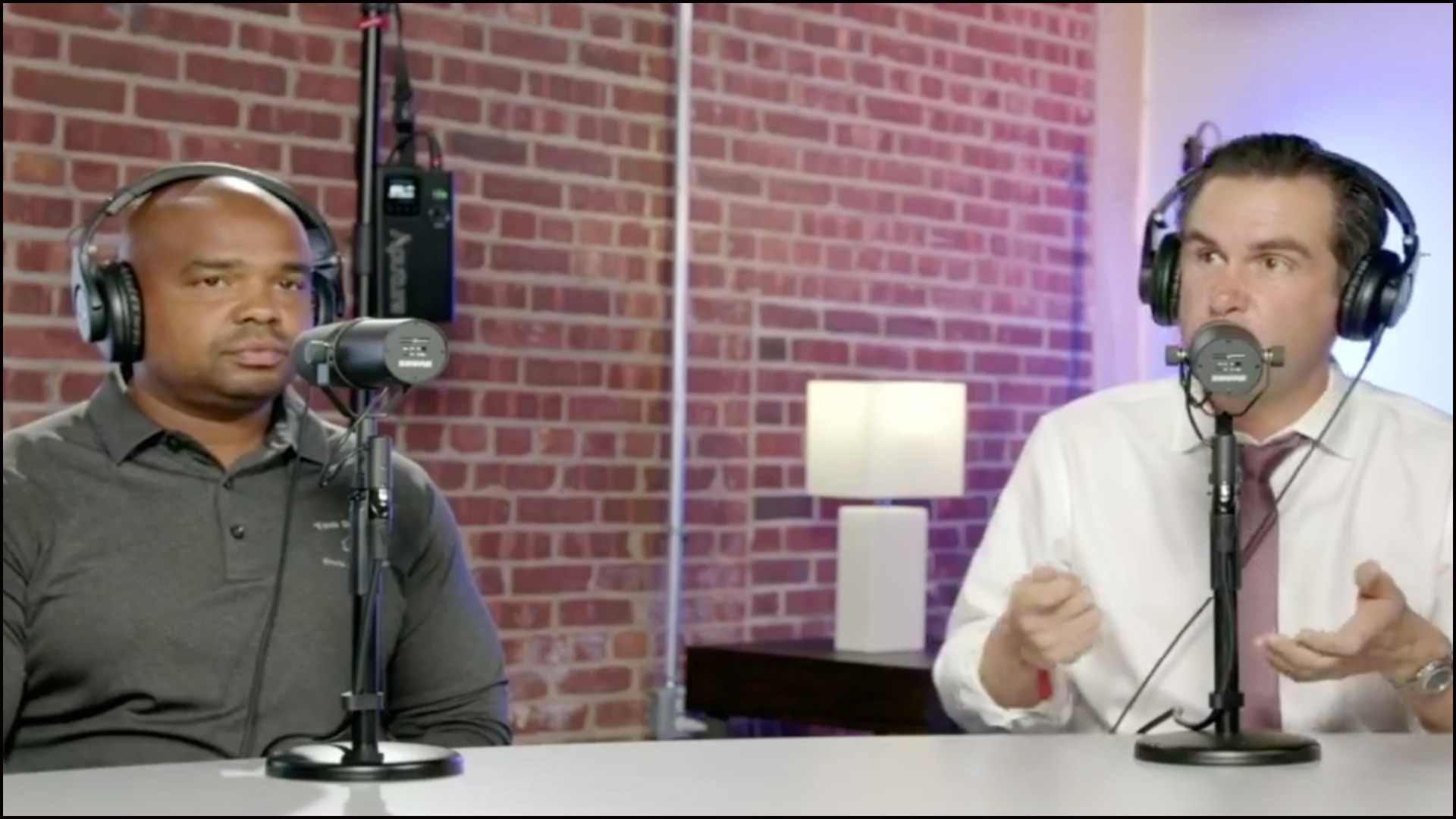How did Tomahawk Strategic Solutions, a private security contractor from Nashville, TN, get one of its first contracts in Jersey City? Mayor Steven Fulop’s 2014 gun control initiative and Remington’s bankruptcy might offer some clues.
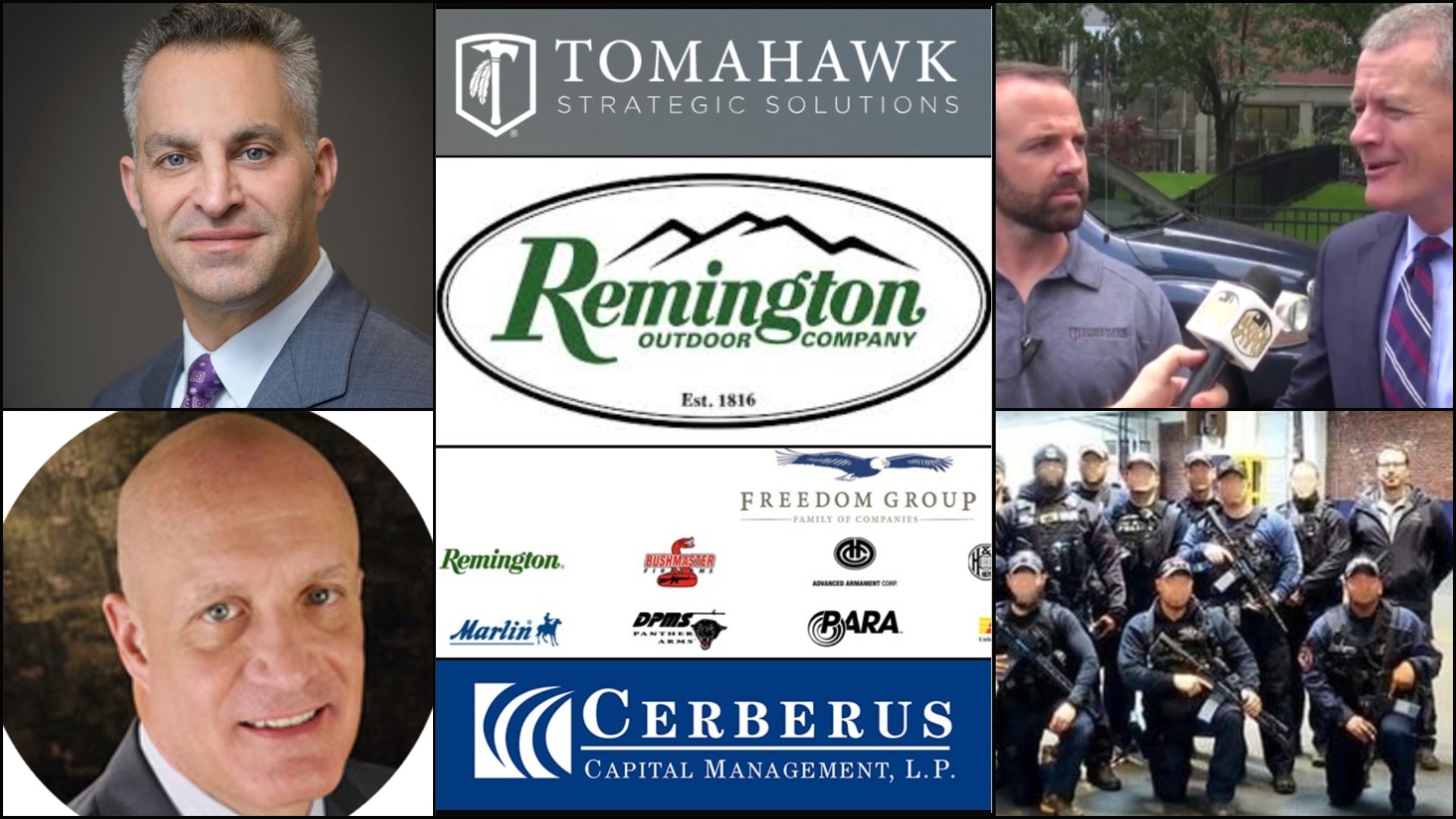
Real Garden State explores the connections between Tomahawk Strategic Solutions, Mayor Steven Fulop’s 2014 gun control initiative, and Remington’s downfall.
Tracing the origins of Tomahawk Strategic Solutions
Back in 2014, one of Jersey City Mayor Steven Fulop’s signature initiatives was requiring that licensed weapons vendors answer a “social responsibility” questionnaire to bid on the city’s guns & ammunition contract. The move boosted Fulop’s progressive credentials, a Democrat that was considered a frontrunner to succeed Gov. Chris Christie, and made big headlines – Data at Center of Guns Push in Jersey City (Wall Street Journal); New Jersey mayor wants gun bidders to answer safety questions (CNN).
However, based on discussions with multiple Jersey City Police Department (JCPD) sources, plus documents obtained via the Open Public Records Act (OPRA), those headlines were nothing more than political theater. In retrospect, the controversial questionnaire – which drew the ire of the National Rifle Association (NRA) – raises more questions about potential bid rigging than social responsibility.
That’s because, despite technical objections, JCPD sources allege Public Safety Director James Shea was intent on the city purchasing Remington products. Of interest to this story, Remington was part of a gun manufacturing conglomerate, Freedom Group, that was owned and operated by Cerberus Capital Management, L.P. – a group of Wall Street power players that bankrupted the iconic American company from Upstate New York.
As for social responsibility, Remington was the manufacturer of the weapon used in the 2012 Sandy Hook massacre and is currently facing a wrongful death lawsuit brought forward by families of the victims. In October 2014, Quartz reported that George Kollitides (Chairman, CEO of Freedom Group) and Walter McLallen (vice chairman of Freedom Group’s board) donated $5,000 and $10,000, respectively, to a group running anti-gun-control ads against Connecticut’s Democratic governor (following passage of new gun laws post-Sandy Hook).
Remington’s Demise & Ties to Jersey City
Kollitides was called the architect of Freedom Group before McLallen announced him as CEO on April 24, 2012. Under the CEO’s leadership, Remington’s historic operation in Ilion, NY – among other manufacturing facilities located throughout America – faced mass layoffs as part of a plan to centralize the company’s operations.
According to a New York Times Magazine article, in 2012, Cerberus engaged in financial transactions that transferred hundreds of millions of dollars to the private equity firm from the gun company. By the time Remington moved to their taxpayer-financed facility in Huntsville, Alabama, the company had accumulated $828 million of debt (during years of record gun sales under Pres. Barack Obama).
Though it’s not mentioned in the Times article, Remington took a big hit after losing its contract with the U.S. Army to make 120,000 M4s and M4A1 carbines. Initially, Remington VP John Day announced the company won the contract on April 24, 2012 (the same day Kollitides officially became CEO). However, another gun manufacturer, Colt’s Manufacturing (Colt), immediately protested and the Government Accountability Office sustained their complaint on July 24, 2012, according to Military.com.
Remington ultimately lost the contract in February 2013, to FN Manufacturing, after the Army’s RFP was reworked and new bids were solicited. Though it’s unclear how many M4s were produced for the Army and never delivered, Remington’s April 2012 announcement stated that the Army had an initial order of 24,000 M4A1 carbines and deliveries were supposed to start in September 2013.
Of note, Day, the VP who announced the Army contract on April 24, 2012, was one of Shea’s contacts at Remington regarding Jersey City’s weapons and ammunition contract. He’s since moved on from the company, briefly working for a gun silencer manufacturer that’s partnered with Tomahawk and is associated with Donald Trump, Jr.
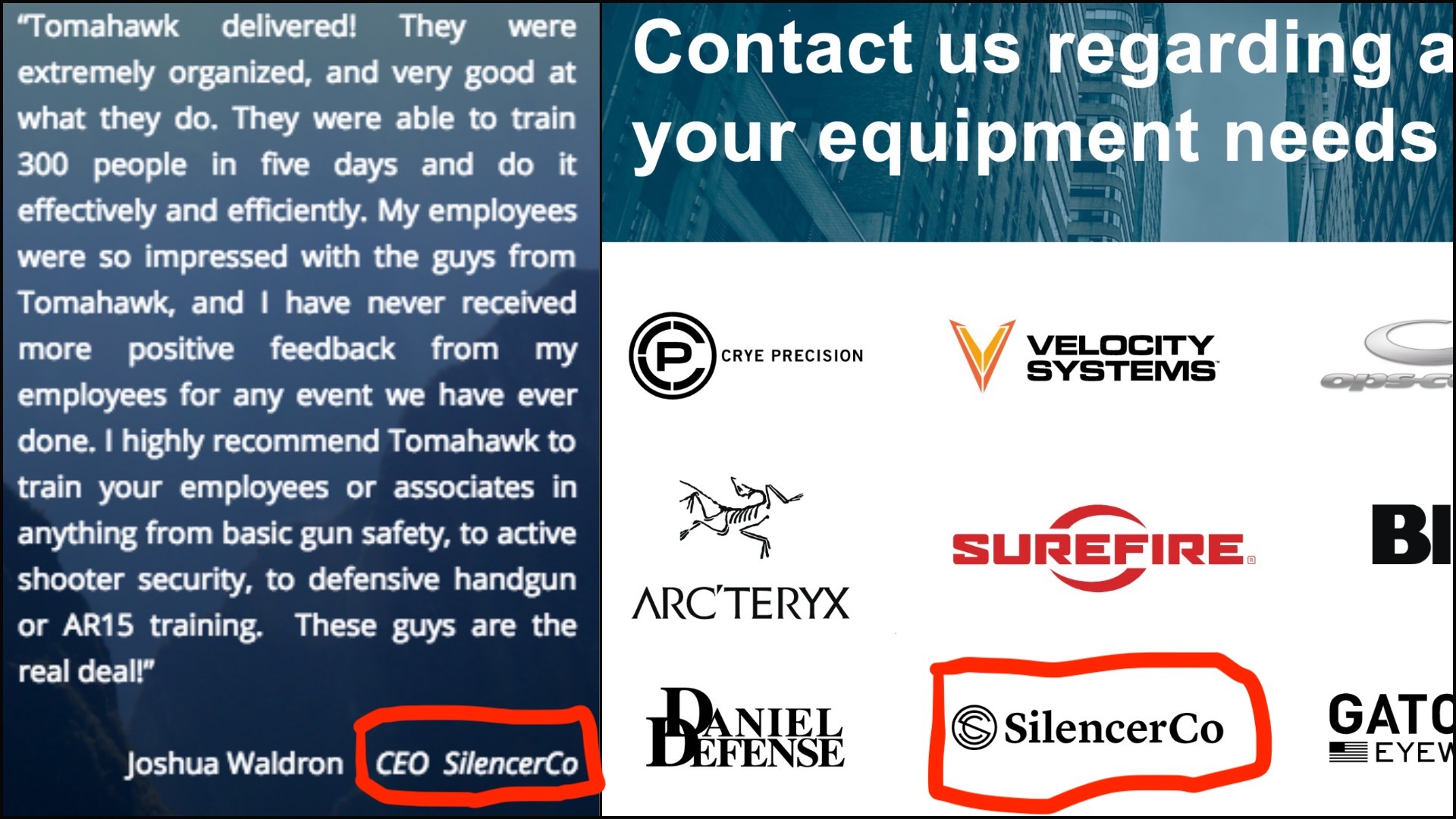
On the left, 2018 screenshot showing SilencerCo is a client of Tomahawk’s training; on the right, recent screenshot showing Tomahawk is a supplier of SilencerCo’s products.
By June 2015, Remington announced that Kollitides would “step down from both positions immediately to pursue other interests,” and that McLallen would retire from his post as vice chairman of the board.
According to the Nashville Business Journal, McLallen was among the Remington executives stationed in Nashville, TN, and even bought a million-dollar condo at a “swanky” luxury high-rise.
The rise of Tomahawk Strategic Solutions
Also in June 2015, the JCPD’s Emergency Services Unit (ESU) began training with Tomahawk Strategic Solutions (Tomahawk) – becoming one of the first clients for the start-up security contractor from… Nashville.
Interestingly enough, McLallen owns at least 10% of Tomahawk, according to pay-to-play documents obtained from the Hudson County Prosecutor’s Office (HCPO) via OPRA request. From 2017 to 2018, Hudson County Prosecutor Esther Suarez awarded at least $250,000 in no-bid contracts to Tomahawk for educational services & equipment. Additionally, NJ Attorney General Gurbir Grewal, while serving as the Bergen County prosecutor, awarded Tomahawk a contract using $29,600 in asset forfeiture funds.
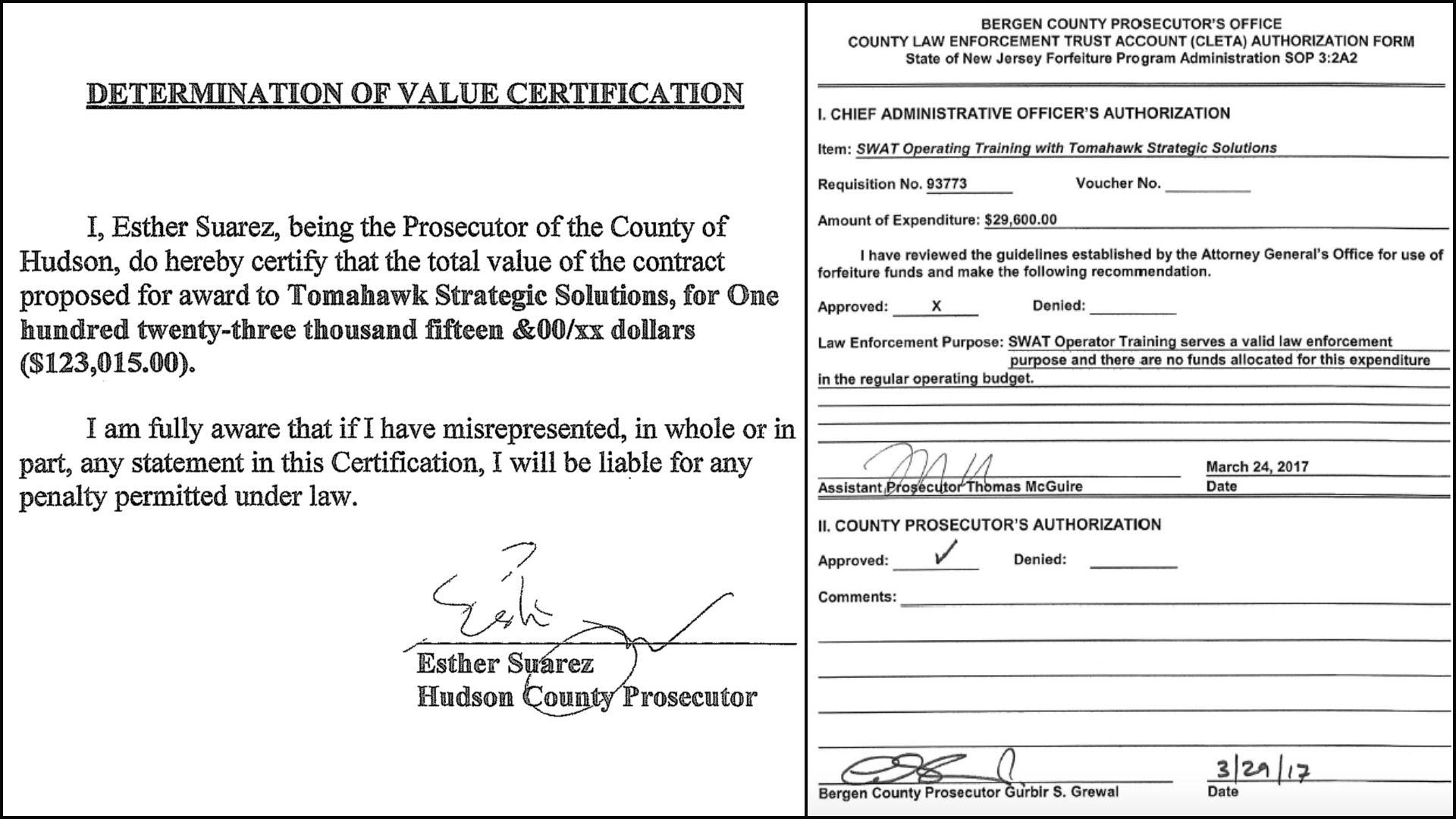
Documents related to contracts awarded by Esther Suarez and Gurbir Grewal to Tomahawk Strategic Solutions.
Unfortunately, based on news reports and city council resolutions, there’s questions regarding whether the Fulop administration withheld information related to Tomahawk from being released via OPRA.
The co-founders of Tomahawk, also owning at least 10% of the company, are retired Navy SEALs Mike Biller (President, COO) and Keith Walawender (CEO). Simply put, their resumes are impeccable. That said, there are questions about the effectiveness of Tomahawk’s ESU training in Jersey City – especially regarding the infamous Newport Mall shooting.
According to Tomahawk’s website, McLallen is co-chairman of the board of directors and was a founding member of the company in 2014. Kollitides is also a member of Tomahawk’s board of advisors – which includes a former Commandant of the Marine Corps, a former CNN contributor, and another high-level finance executive.
Big League Politics
Unlike Fulop’s political aspirations, the relationship between his administration and Tomahawk has lasted for five years without any real intrigue… until the city announced $1,000,000 for de-escalation training with the company amid calls to defund the police.
Whether or not Tomahawk has the right credentials to teach deescalation training, their apparently all-white staff isn’t inspiring any confidence with the public in Jersey City.
Beyond race, there’s also the issue of political hypocrisy for Mayor Fulop. If Kushner Companies can’t build housing in Jersey City because of Jared Kushner’s role in the Trump administration, how can Tomahawk get contracts with the Fulop administration when McLallen and Kollitides were members of Trump’s Second Amendment committee?
When reached by phone, COO Mike Biller said Tomahawk was directing all media inquiries to the City of Jersey City. A spokesperson for the Fulop administration did not respond to an email requesting that Shea be made available for questions regarding this story. This article will be updated if/when either provides comment.
The rest of this piece – The Full Story – reexamines Mayor Steven Fulop’s 2014 gun control initiative, takes an in-depth look at Remington’s demise, and analyzes the rise of Tomahawk Strategic Solutions.
Mayor Steven Fulop’s ‘social responsibility’ questionnaire
Pres. Trump is known to accuse CNN of being Fake News. Whether that attack is fair or not, CNN’s December 2013 report on Fulop’s gun control initiative is factually incorrect. Specifically, the opening paragraph from their article states:
A New Jersey mayor is compelling gun manufacturers bidding for gun and ammunition contracts with the city police to answer questions on gun safety in what is believed to be the first such move in the nation.
Additionally, the CNN article reported that the questionnaire would have six questions:
- What do you do to combat illegal gun trafficking and illegal gun crime?
- Do you manufacturer and sell assault weapons for civilian use?
- Do you agree not to sell certain models of firearms for civilian use?
- Are you requiring your dealers to conduct background checks?
- Do you fund research related to gun violence and smart gun technology?
- Will you commit to prohibiting your brand name from being used in violent video games?
In reality, gun manufacturers do not bid on weapons & ammo contracts; rather, as the Jersey Journal reported in September 2014, the real questionnaire deals with the practices of suppliers (the vendors who actually bid on the contract). Below are the responses submitted by Lawmen Supply Company (Lawmen) and Atlantic Tactical (Atlantic) – the two companies that bid on the contract:
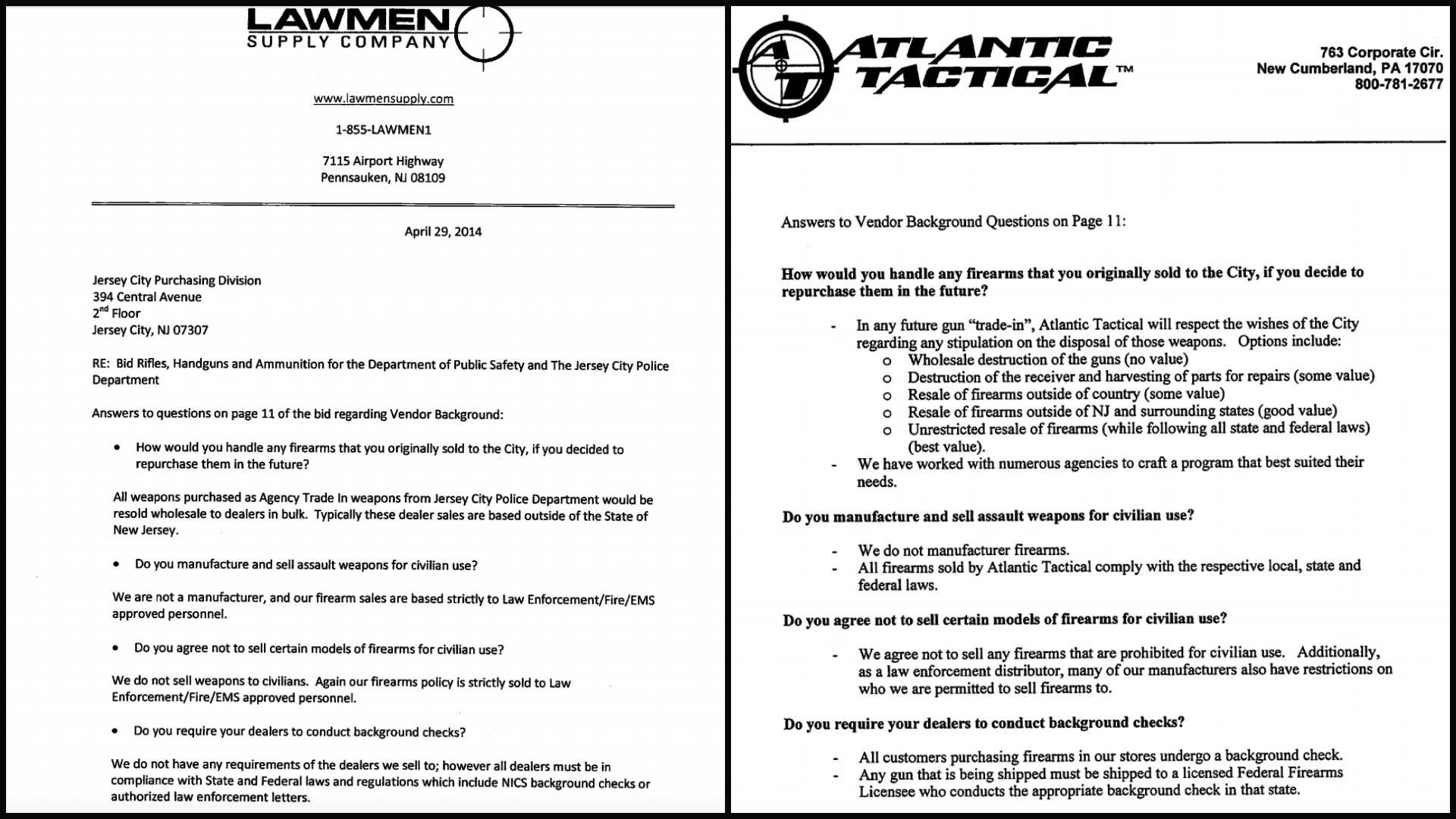
Responses to Jersey City’s 2014 weapons vendor questionnaire
Ultimately, the real questionnaire had four questions (not six). Although Lawmen’s winning bid was about $10,000 higher than Atlantic’s bid, the city spokesperson said “the question of who they sell to and what they will do with weapons we return to them was an important factor.”
When analyzing the questionnaire responses, the city’s quote referencing Lawmen’s successful bid is somewhat perplexing. Based on how the Jersey Journal framed the story, apparently the “important factor” was Lawmen claimed they “do not sell weapons to civilians,” while Atlantic merely complied with “respective local, state and federal laws.”
Nevertheless, when the questionnaire asked How would you handle any firearms that you originally sold to the City, if you decided to repurchase them in the future?
- Lawmen responded that “all weapons purchased as Agency Trade in weapons from Jersey City Police Department would be resold wholesale to dealers in bulk. Typically these dealer sales are based outside the State of New Jersey.”
- Atlantic, among other options, offered the city *wholesale destruction* of trade-in guns.
Union County failed to follow Fulop’s lead on ‘Social Responsibility’; Atlantic Tactical changes policy in 2015
Notably, at the beginning of 2014, then-Union County Freeholder Chairman Christopher Hudak received glowing coverage on NJ.com (The Star Ledger) for promising to follow Fulop’s lead on “social responsibility” when it comes to weapons & ammo contracts.
However, following an OPRA request seeking questionnaire responses, the compliance manager for Union County stated that “after inquiring with the Union County Sheriff’s Office, Prosecutor’s Office, Police Department, Corrections Department, Public Information, and County Counsel, it appears this initiative was not implemented.”
It’s unclear why Hudak’s initiative never came to fruition, but Union County did purchase weapons and ammunition from Atlantic in 2014. Regardless, the issue of “social responsibility” became a moot point for Atlantic on January 27, 2015, when the company announced they would stop selling firearms to the public because of the “small volume of commercial gun sales and the high cost of liability insurance.”
For the record, based on the Fulop Administration’s response to OPRA requests seeking weapons and ammunition invoices – Atlantic did less than $10,000 of business with Jersey City from the time they changed their policy through June 2018.
Remington faces lawsuit from Sandy Hook families
In retrospect, perhaps it would’ve been a great thing for gun control activists if Jersey City had manufacturers, not suppliers, respond to the social responsibility questionnaire initially reported by CNN.
Specifically, families of the Sandy Hook massacre victims, especially those suing Remington, would’ve probably been interested in knowing the company’s answer to – Will you commit to prohibiting your brand name from being used in violent video games?
That’s because, according to CBS News, the lawsuit alleges that Remington targeted “younger, at-risk males in marketing and product placement in violent video games” for its Bushmaster AR-15-style rifle.
Lawmen’s bid was exclusively Remington products; technical issues raised
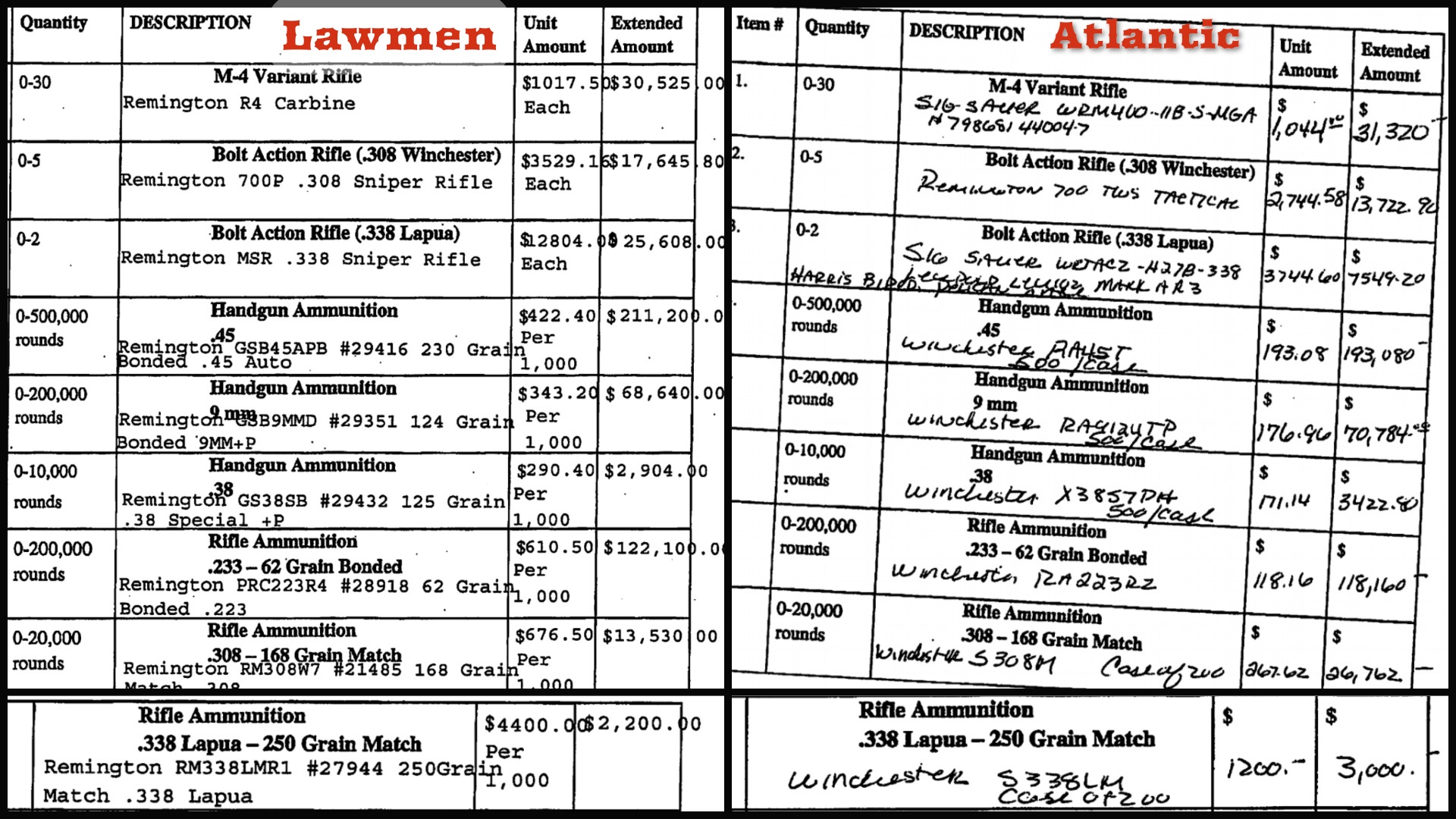
Samples of 2014 bids for Jersey City’s weapons and ammo contract from Lawmen (left) and Atlantic (right).
As previously mentioned, JCPD sources allege Public Safety Director James Shea was intent on the city purchasing Remington products. Also, sources say there was at least one major technical objection raised that Shea dismissed due to cost concerns.
Specifically, sources say that weapons from LWRC International were preferred because their “M-4 Variant Rifle“ had a gas piston operating system, while Remington’s R4 Carbine had a direct impingement operating system. WATCH VIDEO BELOW FOR IN-DEPTH BREAKDOWN:
According to Lawmen’s bid, the JCPD only bought 30 M4s, so it’s interesting that price was a concern for Shea. In reality, the bulk of the city’s purchase was Remington ammunition ($431,794). Notably, the JCPD bought 500 rounds of Remington’s .338 Lapua – a high-powered, long-range cartridge that has devastating capabilities at ranges greater than the width of the Hudson River.
After the weapons & ammo contract was awarded, there’s no records indicating the city purchased Remington products again. By February 2015, the city purchased $9,327 of Winchester shotgun ammunition from Atlantic, and by September 2016 they purchased $80,113 of Speer Gold Dot .45 – which the JCPD has been using at its range ever since.
Wall Street looters and Remington’s bankruptcy
Long before he created the firearms empire Freedom Group, Stephen Feinberg, co-founder and chief executive of Cerberus, started his finance career at the infamous brokerage house Drexel Burnham Lambert (Drexel), according to the New York Times article from May 1, 2019.
The story continues that, Drexel, under the leadership of Michael Milken, pioneered the controversial practice of “leveraged buyouts” – which has rebranded itself within the private equity industry. In 1992, after Drexel was forced into bankruptcy, Feinberg founded Cerberus – a private equity firm which now manages approximately $39 billion.
An example of Cerberus’ non-gun assets includes managing a $300 million investment account, for the state’s pension system, that makes loans to mid-market companies. The deal was approved in 2011 during Gov. Chris Christie’s administration.
As previously mentioned, the Times report claims Cerberus engaged in financial transactions that transferred hundreds of millions of dollars to the private equity firm and saddled Remington with massive loans. By 2015, the company had accumulated $828 million of debt – during years of record gun sales under Pres. Barack Obama – and the bills were due immediately.
Two months after the Huntsville facility opened on April 10, 2015, which was apparently a management disaster, the company announced Kollitides and McLallen would be stepping down from their positions. Less than three years later, in February 2018, the company agreed to a bankruptcy plan with its creditors, including JPMorgan Chase & Co, according to Reuters.
According to recent reports, Remington plans to file for bankruptcy again as part of a plan to sell the company, which is partially owned by JPMorgan, to the Navajo Nation. In the end, it’s not clear how much money Kollitides, McLallen, and Cerberus made off of their takeover of Remington.
The Tomahawk Network: Boards of Directors & Advisors
Tomahawk’s network, especially its boards of directors and advisors, is linked to Drexel, Cerberus, JPMorgan, Remington, and the U.S. Military (among other entities).
As previously mentioned, McLallen is co-chairman of Tomahawk’s Board of Directors and owns at least 10% of the company, according to pay-to-play documents. The other co-chairman of Tomahawk is Nick Pontikes, and he also owns at least 10%, according to the same records obtained from the HCPO via OPRA.
According to Tomahawk’s website, like McLallen, Pontikes worked in the mergers and acquisitions department at Drexel. Pontikes is the Chairman and CEO of Genus Oncology, a clinical-stage biopharmaceutical company, and McLallen sits on Genus’ board. As for the Board of Advisors, below is a quick breakdown of its most notable members:
- Gen. Michael W. Hagee: During the beginning of the Iraq War, from 2003-2006, Gen. Hagee served as the 33rd Commandant of the Marine Corps. In May 2019, Hagee was added as member of Pres. Trump’s Intelligence Advisory Board. In 2012, Hagee was a member of Remington’s board along with McLallen.
- George Kollitides: As previously noted, former Remington CEO and Cerberus employee. Kollitides is also Chief Investment Officer (CIO) at Aegis Capital Advisors LLC, where McLallen is Senior Managing Director and Principal.
- Suzanne Kelly: The CEO and publisher of The Cipher Brief, a national security-focused media company, Kelly’s Tomahawk bio says she was previously an Intelligence Correspondent for CNN, where she “co-founded, co-developed and served as co-editor of CNN’s national security website.”
- Matt Zames: According to Cerberus’ website, Zames joined the private equity firm in 2018 and is President and Senior Managing Director of the company. Prior to that, Zames was most recently the Chief Operating Officer (COO) and CIO of JPMorgan Chase & Co. from 2012 to 2017. Notably, JP Morgan was one of Remington’s biggest creditors. A March 2019 article published by the Financial News dubbed Zames as the American with the “toughest job in finance” – saving Deutsche Bank (which has controversial ties to Pres. Trump and the Russian government).
Furthermore, according to their website, Tomahawk personnel include “Special Forces operators, corporate security experts, SWAT/ESU/Patrol officers (retired and active) hand-selected for their specialized skills and experience, as well as combat and civilian medics.”
Questionable OPRA responses from Fulop administration related to Tomahawk Strategic Solutions
As mentioned earlier in the article, there’s questions regarding whether the Fulop administration withheld information related to Tomahawk from being released via OPRA. Specifically, the following public records requests were filed with the City of Jersey City:
-
R000655-030518: All invoices from weapons/ammunition vendors and Tomahawk Strategic Solutions from July 1, 2013 to December 31st, 2017.
-
R001668-061318: 1) All invoices for weapons/ammunition from Jan 1, 2017 to June 13, 2018; 2) All invoices from Tomahawk Strategic Solutions from Jan 1, 2018 to June 13, 2018.

Invoices for training and equipment from Tomahawk Strategic Solutions released by the Fulop admin.
The city produced seven different invoices for equipment and training from Tomahawk related to the two OPRA requests; however, based on news reports and city council resolutions, the city might have withheld at least two other invoices from disclosure.
For example, there was no invoice produced for the original training from 2015 reported by The Jersey Journal. Additionally, there was no invoice produced for a June 2016 city council resolution awarding the firm $30,000 for a March 2016 exercise at New Jersey City University (NJCU).
Nevertheless, maybe the most interesting question related to the Fulop admin’s responsive records is a $5,000 discrepancy between two different invoices, for the same training exercise at Saint Peter’s University, provided via two different OPRAs.
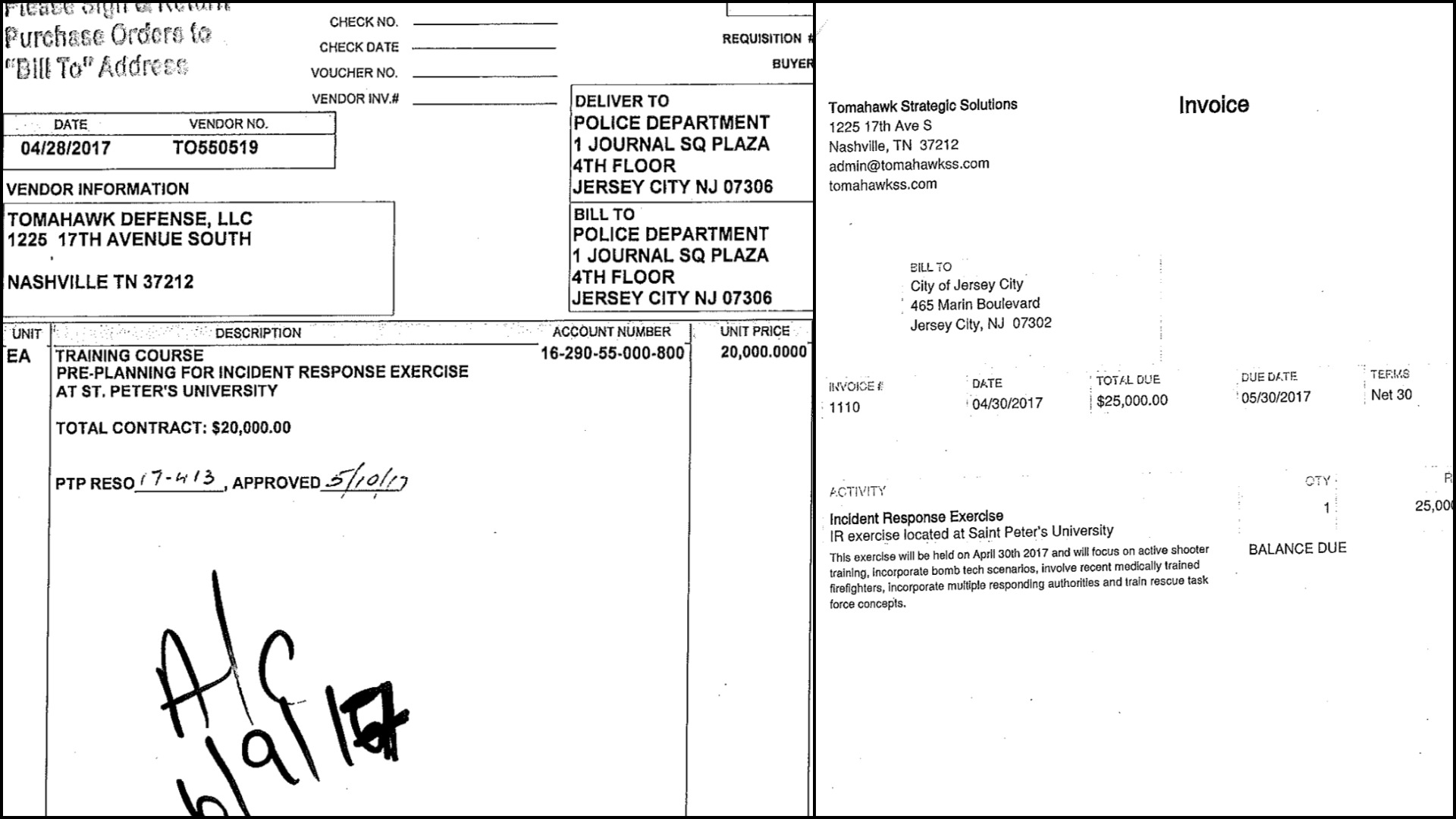
A $5,000 discrepancy between invoices, for the same training exercise, was discovered within documents obtained via OPRA from the City of Jersey City.
Tomahawk Strategic Solutions rises in New Jersey
If there’s one thing that’s clear about Tomahawk, it’s that they like doing business in New Jersey.
As previously noted, since they got their start in Jersey City, the paramilitary contractor has received contracts with the HCPO, Bergen County Prosecutor’s Office & Sheriff’s Office, and apparently Morris County, too.
Business and politics aside, based on conversations with law enforcement sources, the perception is that Tomahawk provides a quality service for tactical officers. However, many have also doubted their qualifications to conduct deescalation training in a place like Jersey City.
In a glowing review provided for Tomahawk’s website in 2018, Eugine Fluri, commander of the Morris County Sheriff’s Emergency Response Team (SERT), wrote that “the leadership and integrity that was demonstrated by [Tomahawk’s] committed staff” was inspiring. On Instagram, JCPD ESU Officer Michael Camacho wrote that he had “fun” training with Tomahawk.
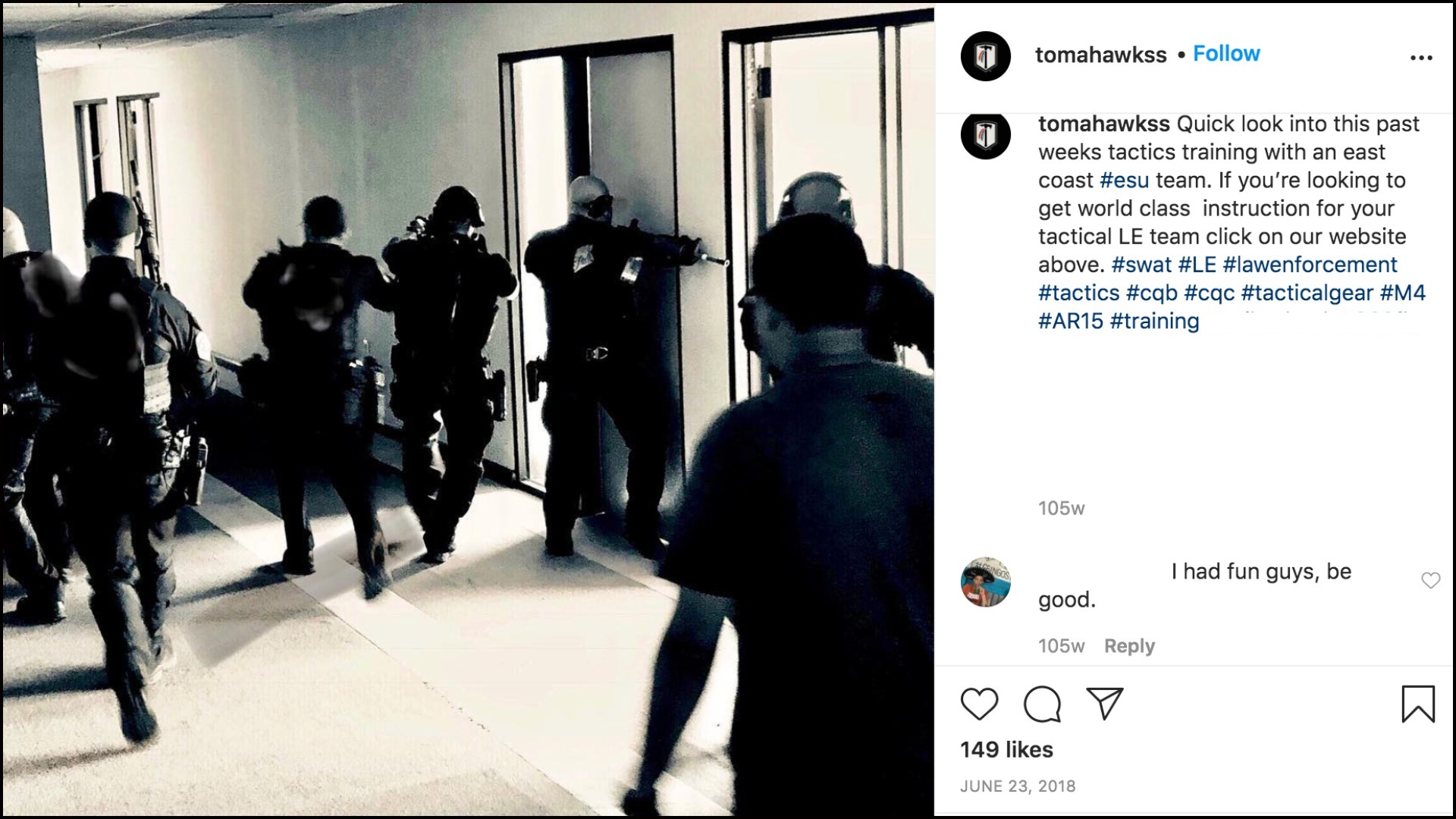
Jersey City ESU member Michael Camacho had a fun time training with Tomahawk Strategic Solutions.
The Newport Mall Shooting
While training can definitely be fun for tactical officers, it’s unclear whether Tomahawk has actually improved Jersey City’s preparedness for worst-case scenarios.
According to the website Inc., “Keith Walawender and Mike Biller served with one of the Navy SEALs’ most elite teams, the Naval Special Warfare Development Group–also known as SEAL Team 6 and DevGru–which undertook the mission that killed Osama bin Laden.”
As previously stated, there’s no doubt Biller and Walawender have serious credentials, but did that actually translate into good outcomes for Jersey City? Below is a snippet of the two discussing the January 2019 Newport Mall shooting with Inc.:
Biller: One of our first clients was Jersey City, New Jersey. They wanted us to assess their tactical team–structure, equipment, everything. We didn’t want to be the kind of company that comes in, trains a few officers for three days, and leaves. We wanted to get our hands on training your whole team–get them integrated with patrol officers, work with the paramedics and firefighters, set up a rescue task force–and then test that.
We did that for Jersey City, and then set up a full-blown training exercise at Newport Centre mall there, so they experienced all that integration of different responding authorities, and got to work face-to-face with officers they wouldn’t have unless a situation arose.
Walawender: Sixteen months later–this past January–there was a report of an active shooter at Newport Centre. It was gang violence up on the third floor, in the food court. Law enforcement came in using the training that we’d set up for them, and the only people injured were the instigators. Everybody else was safely evacuated. No loss of life. No stampedes.
Walawender is correct that 1) there was a shooting at the Newport mall and 2) “it was gang violence up on the third floor, in the food court.” Beyond that, his recollection of what occurred is debatable because:
- The Jersey Journal’s lede said the shooting “sent panicked shoppers fleeing” and viral video of the incident showed something very close to a stampede:
- By the time “law enforcement came in using the training [Tomahawk] set up for them,” the shooter had either escaped from the mall or the JCPD was unable to stop them from fleeing.
- Yes, everyone was safely evacuated… hours after the shooter had already escaped the mall. Despite knowing the threat was neutralized, the JCPD kept people locked in department stores to conduct a glorified evacuation drill.
Furthermore, there was “no loss of life” because the shooting involved a limited group of individuals, advances in medical technology, and pure luck. The true lesson of the Newport mall shooting is that, despite high-level training in the facility and a former NYPD official running public safety, Jersey City was woefully unprepared for a potential terror attack.
Finally, the Fulop administration paid Tomahawk $45,000 for a tactical entry course, but were those techniques used during the Kosher market shooting? If the answer is no, was the money spent on ESU wasted because the JCPD’s leadership is incompetent?
The politics for Fulop, Shea, and Tomahawk Strategic Solutions moving forward
The politics are almost as straightforward as the $1,000,000 question – will the Jersey City Council continue to fund Tomahawk? Below is an analysis of the politics for three councilpersons:
- Ward A Councilwoman Denise Ridley wants to fund deescalation training as part of the “8 Can’t Wait” initiative supported by Pres. Obama, but how could she use that reasoning to justify paying a company connected to people that actively opposed Obama’s gun control agenda?
- Ward D Councilman Yousef Saleh was appointed to his seat on the council following the death of Michael Yun and is already seen by many as another puppet of the mayor. Given his Bernie Sanders-esque progressive politics, it probably wouldn’t be a good look to support Fulop’s proposed contract for Tomahawk.
- Ward E Councilman James Solomon rose to political relevance through the local #BoycottTrumpKushner movement and practices Elizabeth Warren-esque progressive politics. How could Solomon justify funding such a small company so closely tied to Wall Street bigwigs, Remington, and the Trump administration?
Besides the politicians, there’s also the question of whether there’s any energy left in the local activist movement following the death of George Floyd. Their voices may have stopped the latest contract for Tomahawk, for now, but even the Jersey Journal is suggesting that paying Tomahawk for deescalation training is a good thing.
In the end, Tomahawk will likely get the contract that caused an uproar, regardless of what’s written in this report. Nevertheless, it’s 2020, so it’s anyone’s guess how the situation will actually turn out.


